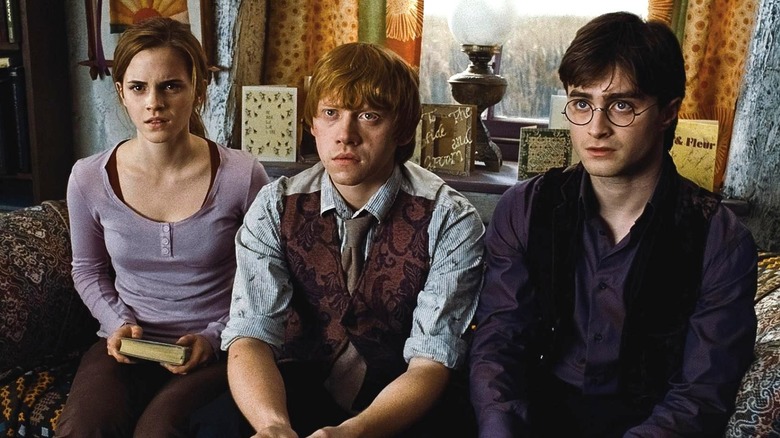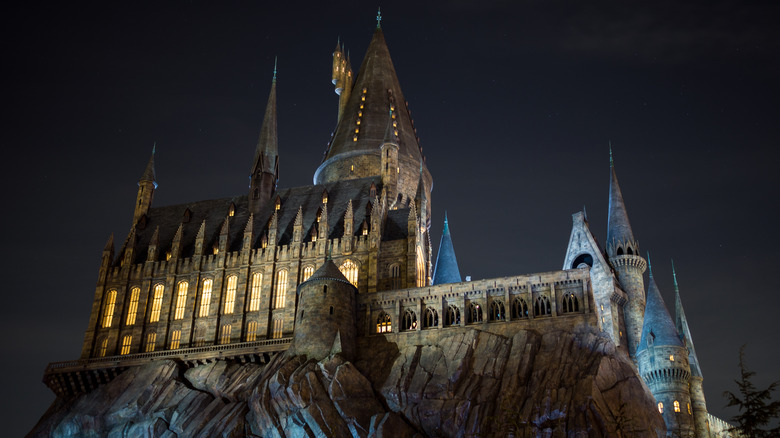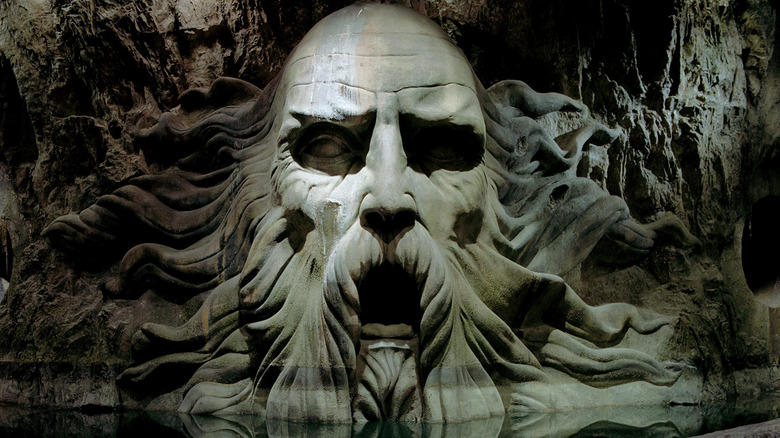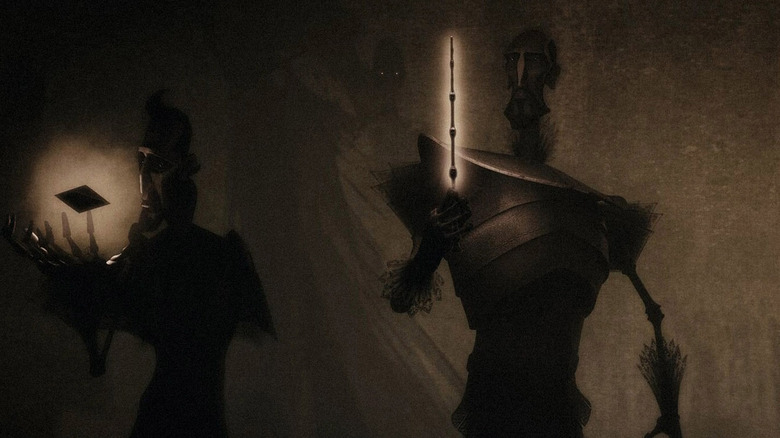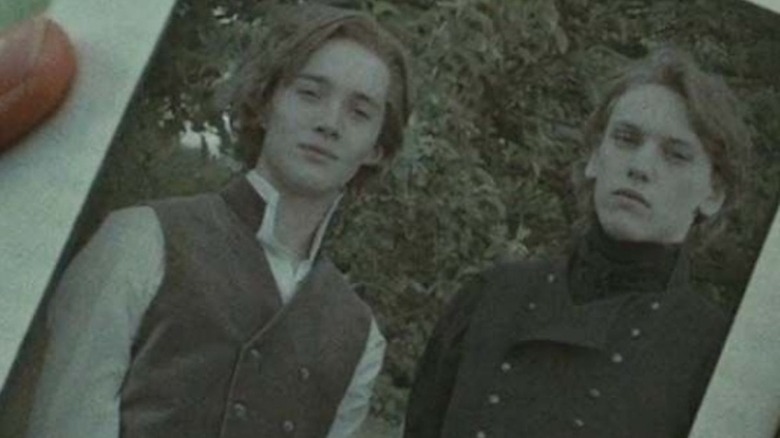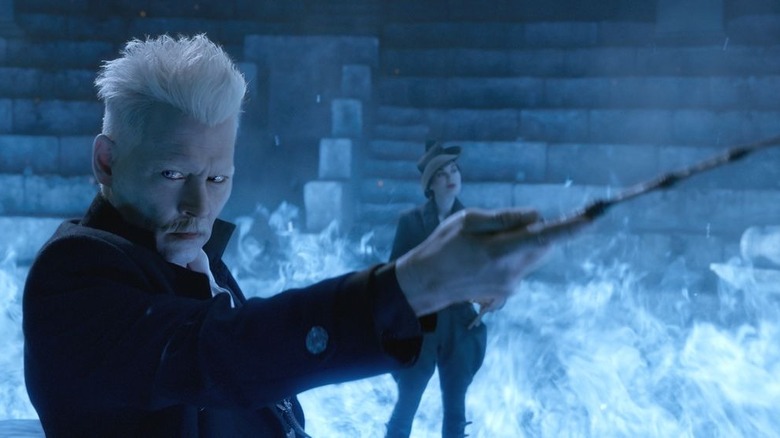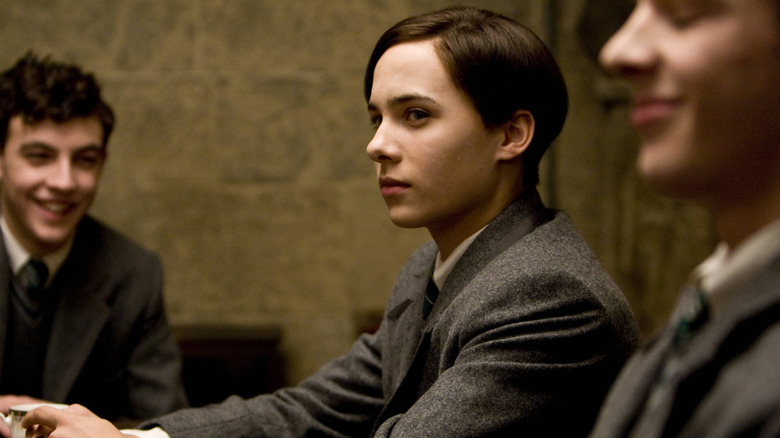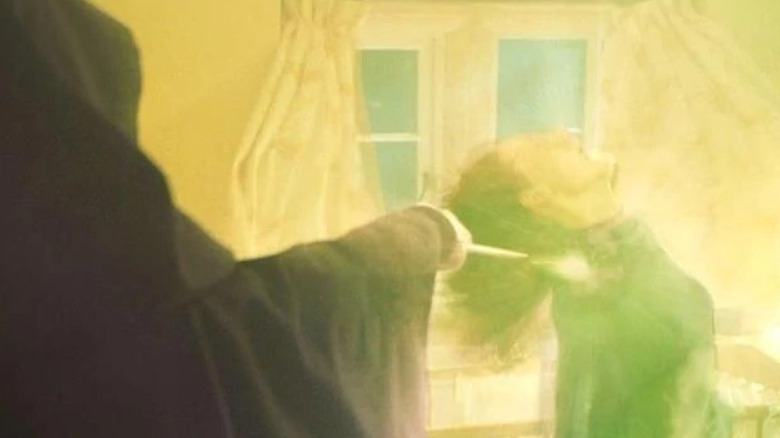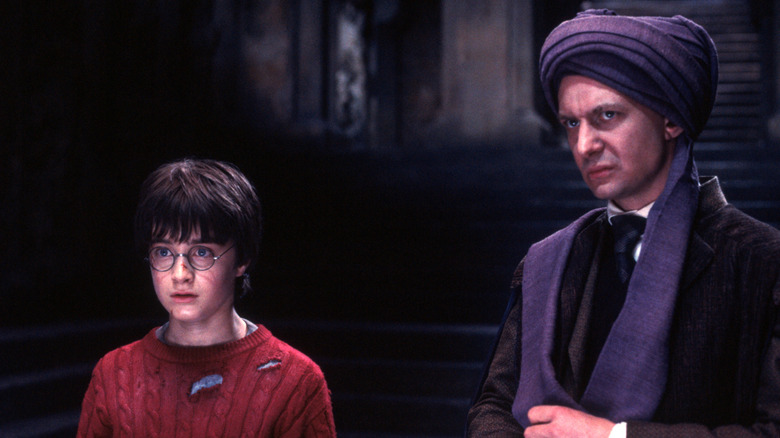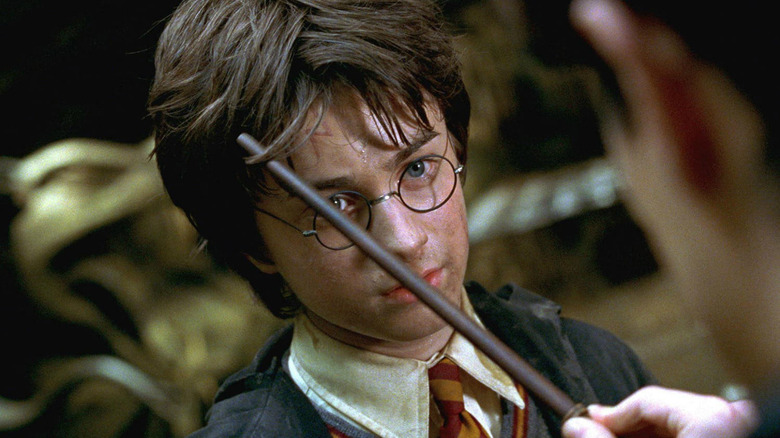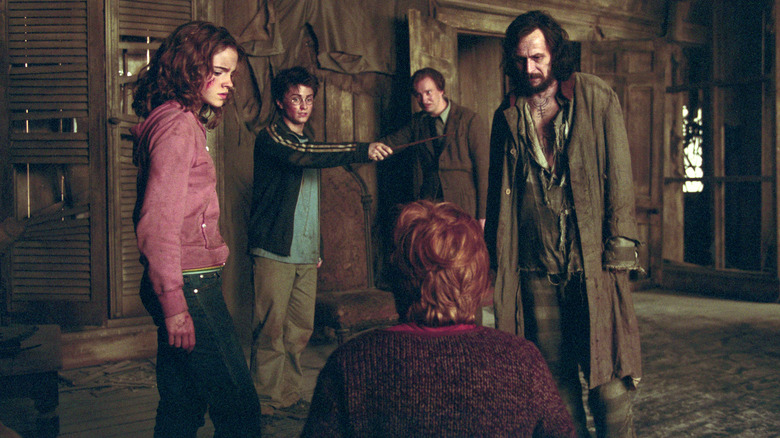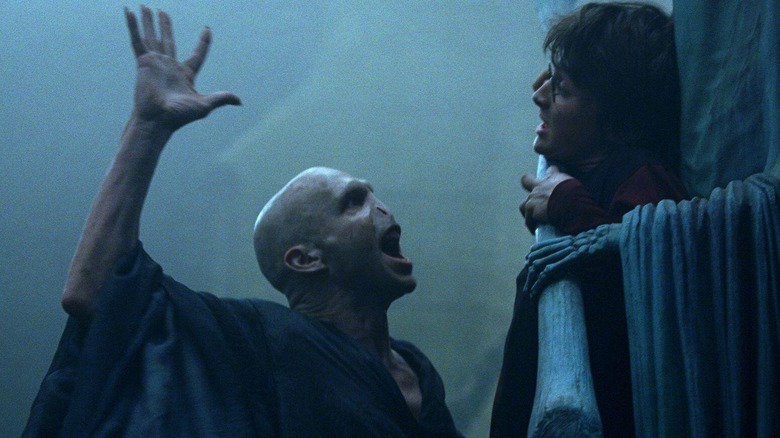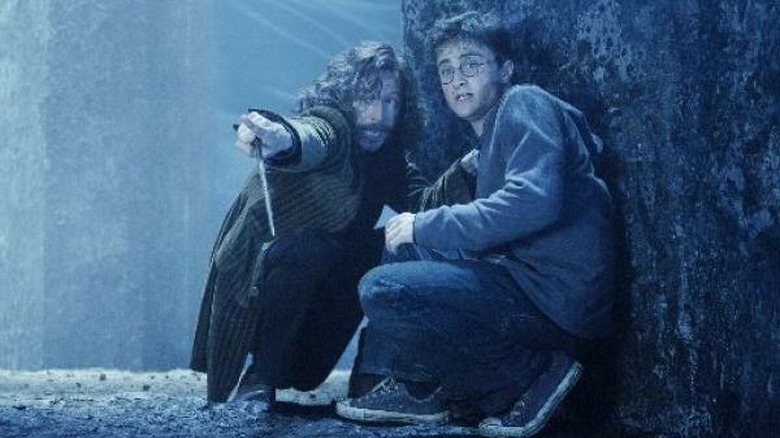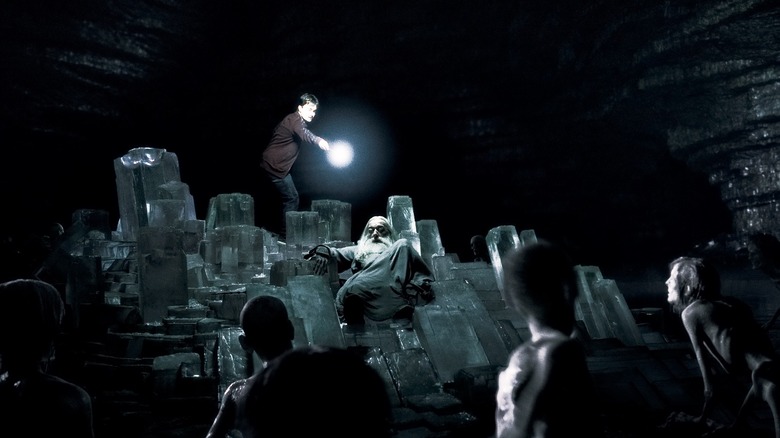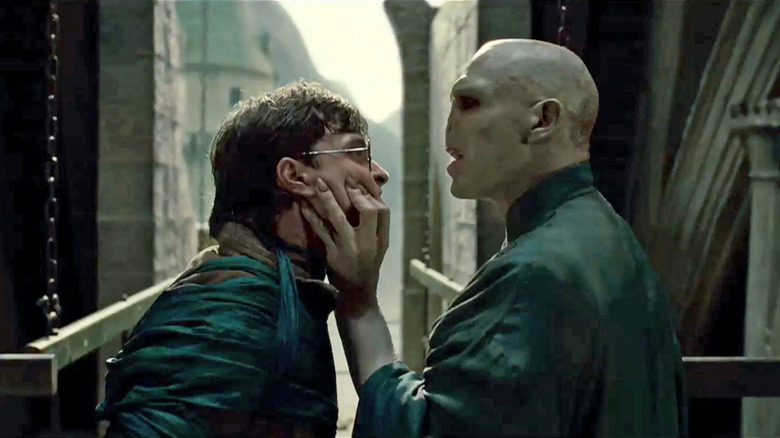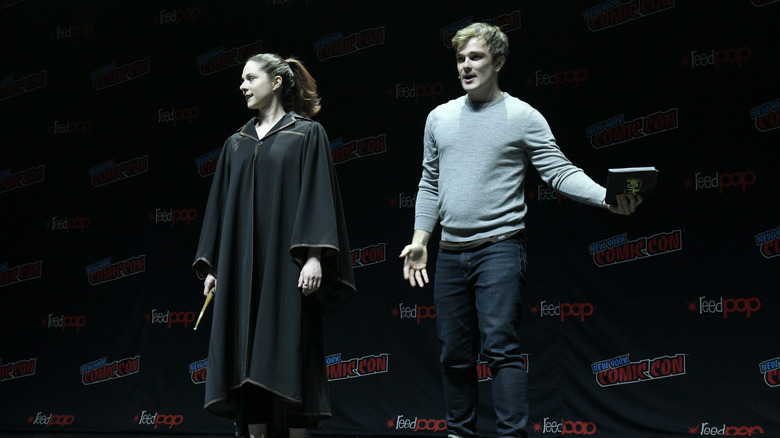The Entire Harry Potter Timeline Explained
There are successful books, there are extremely successful books, and then there are the once-in-a-lifetime books that define an entire generation and re-write the rules of the game for all future books in their genre. The "Harry Potter" novels, written by J.K. Rowling, were that exact sort of lightning in a bottle, reaching unheard of levels of popularity and making Rowling the first novelist to become a billionaire.
The "Harry Potter" franchise consists of seven original novels, a spinoff play, eight live-action film adaptations, dozens of video games, and even a prequel film series. And it all rests on the shoulders of a young man named Harry Potter, who discovered at an early age that he belonged to a secret society of witches and wizards, and who was destined to defeat the most evil sorcerer of all time, Lord Voldemort.
Since the release of the first book in 1997, Rowling has created an elaborate mythology surrounding Harry and the wizarding world he inherits. We also learn about major events affecting Harry's battle against Voldemort that had been set in motion centuries before that first "Harry Potter" novel. Let's take a look at the complete timeline of the franchise and all the major players involved.
The creation of Hogwarts (10th century)
There was an era in which witches and wizards did not live in hiding. Prior to around 100 A.D., they were known to work alongside Muggles (non-magical folks) in an open society — it was even considered a badge of honor for a Muggle king to have a sorcerer as a part of their court. But over time, the sentiments of the Muggle population began to change.
Increasingly, witches and wizards came to be viewed with suspicion and blamed for any bad luck that might befall the Muggles. In response, the magical population began to close ranks and draw away from their Muggle brethren. As the veil of secrecy around wizarding society grew with each passing century, its members became desirous of consolidating their magical power and knowledge for future generations.
This resulted in the creation of Hogwarts School of Witchcraft and Wizardry, sometime between 990 and 1000 A.D., by the greatest magicians of the time: Godric Gryffindor, Helga Hufflepuff, Rowena Ravenclaw, and Salazar Slytherin. Using the magical Sorting Hat, each founder created their own House within the school to train students with specific characteristics that the founders particularly valued. Over time, Hogwarts came to be known not just as the best wizarding school in the world, but also one of the most powerful magical institutions on the planet.
The departure of Slytherin (Early 11th century)
For a while, the four founders of Hogwarts worked together in harmony. They taught many gifted students, the most famous of them likely being Merlin the Magician of Arthurian legend. But over time, cracks began to appear in their fellowship. The most serious confrontation occurred between Slytherin and Gryffindor over the quality of students who should be allowed to attend Hogwarts and take advantage of their vast knowledge of the mystic arts.
Slytherin believed that Hogwarts should only be open to "purebloods," i.e., students born from wizarding families. The other founders, led by Gryffindor, believed that the school should be to open to everyone, including "half-bloods" (those with only wizarding parent) or even witches and wizards from entirely Muggle families, known as "Muggle-borns" (or, to some, the extremely derogatory "mudbloods").
The issue became so heated that Slytherin gave up his position at the school in anger. Years after he left, rumors grew that Slytherin had created a secret chamber within Hogwarts as the resting place for a monster that would one day wake up and rid the school of non-purebloods. Slytherin's obsession with pureblood superiority echoed through the ages would find expression centuries after his death in the form of Lord Voldemort and the Death Eaters.
The Deathly Hallows are created (13th century)
Much of wizarding history belongs more to the realm of myth than fact, and such is the story of the Peverell brothers: Antioch, Cadmus, and Ignotus. Legend says the three brothers were gifted certain objects by Death itself — a powerful wand, an invisibility cloak, and a stone to bring dead people back to life — which would allow them mastery over Death itself.
For a long time, this legend was considered little more than a children's fable. Albus Dumbledore, however, believed that the myth was based on some solid facts. Dumbledore theorized that the brothers in the story were gifted magicians who, possibly in the 13th century, managed to create three immensely powerful magical objects ( collectively called the "Deathly Hallows") that in combination would allow the user to become impervious to any harm.
Over the years, one particular Deathly Hallow gained particular notoriety: the wand. It was believed to be the most powerful wand in existence, which would allow its wielder to win any duel. The weapon came to be known by many names, including the Elder Wand, the Wand of Destiny, and the Deathstick. It supposedly could only be won in battle, and many bloody wars were fought over the years for ownership of the Elder Wand until, at some point, it passed out of recorded history.
Dumbledore meets Grindelwald (1899)
Hogwarts has been a home for many great witches and wizards over the years, but arguably the greatest of them was Albus Dumbledore, who arrived at the school as an 11-year-old in 1892. Right from the start, the teachers at Hogwarts knew there was something exceptional about Albus and predicted great things for the budding wizard.
Those predictions turned out to be true. Albus was a star student, and he carried out extensive research into theoretical areas of magic far beyond his years. His fame grew with each passing term, but he was frustrated in his ambitions by his responsibilities to his family, particularly after his younger sister, Ariana, accidentally killed their mother, leaving Albus in charge of the household. Shortly after graduating from Hogwarts, Albus kindled a friendship (and romance) with the equally brilliant young wizard Gellert Grindelwald, recently expelled from his own school. Together, Dumbledore and Grindelwald sought to confirm the existence and location of the Deathly Hallows.
The duo's dreams of ruling the world of Muggles and wizards alike as benevolent dictators were shattered, however, when Dumbledore discovered the extent of Grindelwald's cruelty. Grindelwald got into an argument with Albus' disapproving younger brother, Aberforth. They started dueling, and Dumbledore was forced to take up arms as well. During the chaos, Ariana was killed. Grindelwald panicked and fled, and Dumbledore was left to pick up the pieces, along with a lifelong guilt over his role in the death of his sister.
The rise and fall of Grindelwald (1905-1945)
After his fallout with Dumbledore, Grindelwald continued on his dark path alone. He worked in secret for many years amassing an army. Most notably, in 1905, Grindelwald was able to locate and acquire the legendary Elder Wand after stealing it from its previous owner, famed wandmaker Mykew Gregorovitch. More powerful than ever, Grindelwald set about plotting his rise to power and plans for world domination.
Meanwhile, Dumbledore had seen the error of his ways with regards to his earlier ambitions. Humbled by the death of his sister, Dumbledore decided he could not be trusted with power and choose to become a teacher at Hogwarts. He watched from afar as Grindelwald's power grew. Filled with shame over his part in Ariana's death and held back by a secret blood oath, Dumbledore wished to avoid confronting his former friend and sent Newt Scamander and other allies to stop Grindelwald, instead.
When those efforts proved in vain, Dumbledore had no choice but to take matters into his own hands. He finally entered into open war with Grindelwald in 1945, and two ultimately engaged in a wizarding duel that is widely considered the most legendary magical battle of all time. Although Grindelwald was a formidable adversary, Dumbledore managed to win by a hair's breadth. Grindelwald was defeated and imprisoned, and Dumbledore became the new master of the Elder Wand, and the most powerful wizard in the world.
Tom Riddle plans his ascent (1938-1970)
After the fall of Grindelwald, the wizarding world congratulated itself on the defeat of the greatest dark wizard of all time. Little did they know that Grindelwald was merely a primer for the true evil that was about to be unleashed on the world.
In a small village in Britain, a witch named Merope Gaunt, a direct descendant of Salazar Slytherin, lured a handsome Muggle into marriage through magical trickery. The result of this unfortunate union was a boy whom Merope named Tom Marvolo Riddle. After his father abandoned Merope, who died in childbirth, Riddle was raised in a Muggle orphanage in London until his 11th birthday, when he was invited to become a student at Hogwarts by none other than Albus Dumbledore himself.
Riddle began studying at Hogwarts in 1938. Over the next few years, the handsome and brilliant student discovered his connection to Salazar Slytherin and became convinced of pureblood superiority — despite the fact that Riddle himself was a half-blood. Riddle also collected a coterie of followers and became obsessed with the idea of conquering death. His obsession continued after he graduated from Hogwarts, and he spent the next few decades delving deeply into the forbidden arts. Riddle's experiences fundamentally changed him, both mentally and physically, and he emerged from his own experiments as the dreaded dark wizard, Lord Voldemort.
The rise and (first) fall of Lord Voldemort (1970-1981)
Having assumed the identity of Lord Voldemort, Tom Riddle set about expanding his network of followers to include giants, dementors, werewolves, and all manner of foul magical creatures. With a formidable army now at his command, Voldemort launched an all-out attack against the wizarding world in Britain, seeking to overthrow the Ministry of Magic and set himself up as a new despot.
Rumors of Voldemort's power and cruelty grew to such proportions that people were afraid to say his name, instead calling Voldemort "He-Who-Must-Not-Be-Named" or "You-Know-Who." Despite his might, however, Voldemort appeared reluctant to directly confront his former teacher, Albus Dumbledore, who had his own army: the Order of the Phoenix. Two members of the Order were Lily and James Potter, who, in 1980, were expecting their first son.
That same year, a prophecy was delivered by controversial seer Sybill Trelawney, predicting that a child "born as the seventh month dies" would be the cause of Voldemort's defeat. In 1981, acting on the words of the prophecy, Voldemort visited the home of the Potters. After killing Lily and James, the Dark Lord delivered the killing curse to their infant son, Harry. But by sacrificing herself for Harry, Lily had invoked a powerful protective magic, which caused the curse to deflect and rebound upon its caster. While not actually killed as the wizarding world believed, Voldemort's power broke, and he was forced to flee in a ruined and disembodied state.
Harry Potter grows up and arrives at Hogwarts (1981-1991)
As news of Voldemort's defeat began to spread, Dumbledore acted quickly, depositing the infant hero in the care of Lily's sister, Petunia, a Muggle who lived with her husband, Vernon Dursley, and their son, Dudley. The Dursleys intensely disliked magic of any kind, but (very begrudgingly) allowed Harry to stay with them, though his childhood with the Dursleys was defined by hardship and abuse.
As Vernon and Petunia had concealed the truth of Harry's magical heritage, it fell to Hogwarts gamekeeper and Dumbledore's right-hand man Rubeus Hagrid to personally visit Harry on his 11th birthday and tell him there was a place waiting for him at the greatest magical school in the world. Confused and full of doubts, Harry arrived at Hogwarts to find he was viewed as a great hero for defeating Voldemort, an incident he did not remember.
Harry's first year at Hogwarts was eventful — he made friends for life in the form of Ron Weasley and Hermione Granger, met a teacher named Severus Snape who seemed to hate him, and discovered a talent for riding broomsticks and playing Quidditch. Finally, Harry uncovered a plot by Lord Voldemort, who had possessed a Hogwarts professor name Quirrell, to return to power using the fabled philosopher's (or sorcerer's) stone. Although Harry was able to keep the stone from Voldemort's clutches, Dumbledore warned him that the Dark Lord was not truly defeated and remained a threat to the wizarding world, particularly Harry.
Opening the Chamber of Secrets (1992-1993)
Harry's second year at Hogwarts began with he and Ron crashing a flying car into an ancient magical tree on the Hogwarts grounds. The duo barely escaped expulsion, and the year went downhill from there. Most ominously, Harry was persistently targeted by a house-elf named Dobby, who repeatedly attempted to keep the young wizard away from Hogwarts.
The nature of the danger Dobby warned of soon became apparent when students, ghosts, and animals began experiencing attacks by some unseen force. A message written in blood on the walls of the school declared that the secret chamber created by Salazar Slytherin to rid the school of witches and wizards of Muggle parentage had once again opened. As Harry and his friends tried to get to the bottom of the mystery, students continued to get attacked, Dumbledore was removed from his post as headmaster, and the school came close to getting shut down.
After several hair-raising adventures, Harry and Ron discovered that the Chamber of Secrets had been opened by a remnant of Tom Riddle's soul, preserved in his school diary and acting through Ron's mind-controlled little sister, Ginny. Harry felt compelled to confront Riddle directly, as well as the giant snake known as the basilisk, which was responsible for attacking the students. Harry managed to defeat Riddle, and in the process discovered a mysterious connection between himself and the villain that would soon come back to haunt him.
The Marauders return (1993-1994)
By his third year, Harry was beginning to get a hang of what it meant to be a famous person in the wizarding world. He had his loyal friends at his side, and he had a new favorite teacher in the form of Professor Remus Lupin. Harry also got a brand new and very expensive broomstick called a Firebolt as a mystery present and started noticing a cute girl named Cho Chang on the Ravenclaw Quidditch team.
But these relatable school hijinks took a backseat to the real drama of the year. Sirius Black, the most dangerous prisoner in the wizarding prison of Azkaban, had escaped, and was rumored to be coming to Hogwarts with Harry as his target. Harry also learned some unwelcome truths about his parents, including the revelatory fact that Snape and his father had been sworn enemies at school. James Potter had been close friends with both Lupin and Black, forming a gang who called themselves "The Marauders," but Black had betrayed James and Lily by telling Voldemort where they had been hiding.
Harry was enraged to discover this betrayal, and received a further shock when he saw Lupin helping Black. In the end, however, it was revealed that Black had been framed by the fourth member of the Marauders, Peter Pettigrew. After a desperate race against time (literally), Harry managed to save Black from being returned to Azkaban, but Pettigrew escaped in the chaos.
Voldemort returns (1994-1995)
Starting his fourth year at Hogwarts, Harry suddenly had a loving godfather in the form of Sirius Black, who was still hiding from the Ministry of Magic. The situation wasn't ideal, but Harry looked forward to a relaxing year when he could sit back with his friends and enjoy watching the older students compete in a legendary competition called the Triwizard Tournament.
Unfortunately, despite the fact that he wasn't old enough to participate, Harry was magically and mysteriously declared one of the four Triwizard champions. Ron broke off their friendship over feelings of jealousy at the attention Harry was receiving, and the young wizard had to rely on the help of Hagrid, Hermione, Dobby, and their new teacher, "Mad Eye" Moody, to get through the three tasks of the tournament while competing against the older contestants.
The contest ended when Harry and fellow Hogwarts student Cedric Diggory touched the Triwizard Cup simultaneously ... only to be suddenly and unexpectedly transported to a graveyard. It turned out that Harry's entry in the tournament had been part of a plan concocted by Lord Voldemort and his lackeys. After killing Cedric, Voldemort used Harry's blood to enact a ritual that restored him to his old body, more powerful than ever. Somehow managing to escape certain death at the hands of the Dark Lord, Harry returned to Hogwarts to inform Dumbledore that the most powerful dark wizard of all time had returned once again to wreak havoc on the world.
Suspicion, secrets, and the death of Sirius Black (1995-1996)
Harry had seen Voldemort return, but he faced an unexpected challenge during his fifth year at Hogwarts: No one outside of Dumbledore and his closest friends were willing to believe his story. For most of the year, Harry was treated like a liar and an outcast by the majority of the wizarding world, including his fellow students. The Ministry of Magic was so suspicious of both Harry and Dumbledore that they sent Dolores Umbridge to Hogwarts to collect information and spread propaganda, eventually assuming the position of "Hogwarts High Inquisitor." Harry turned to new friends like Luna Lovegood to get his story out to the wizarding public, but he was developing an extremely short fuse, and an attempted romance with Cho Chang went nowhere. Even worse, Harry began to feel ignored by Dumbledore, who appeared to be actively avoiding him. Meanwhile, Harry's unexplained connection to Voldemort was growing stronger and more frightening, and Voldemort eventually used this connection to lure Harry into a trap.
Surrounded by Voldemort's henchmen, the Death Eaters, Harry and his friends were saved by Dumbledore and the re-established Order of the Phoenix, but the battle cost Sirius Black his life. Maddened with guilt and grief, Harry lashed out at Dumbledore, who revealed the secret he had been hiding for so long. According to Trelawney's prophecy, Harry's destiny was inextricably linked with Voldemort's, and the two would someday have to fight each other until only one remained alive.
Dumbledore falls (1996-1997)
Despite still aching over the loss of Sirius, Harry's sixth year at Hogwarts brought him some relief. For one thing, he found unexpected but welcome romance in the arms of Ginny Weasley. For another, with Voldemort and the Death Eaters having revealed themselves, Harry was now being treated as a hero, the "Chosen One" who was destined to rid the world of Voldemort once and for all. Dumbledore also started taking Harry into his confidence, teaching Harry all he had learned of Voldemort's secret history.
With Dumbledore's help, Harry learned the true nature of Voldemort's seeming immortality, which lay in the six pieces of the Dark Lord's soul that Voldemort had detached from his body and stored inside special items called Horcruxes. In order to kill Voldemort for good, each part of his soul needed to be destroyed; Dumbledore and Harry had already destroyed one apiece, and Dumbledore intended them to hunt the other four together. Harry's faith in Dumbledore was shaken, however, when he discovered that it was Severus Snape who had overheard the prophecy regarding Harry and Voldemort during his time as a Death Eater, and relayed the information to the Dark Lord, leading to the death of Harry's parents. Yet Dumbledore continued to trust that Snape had reformed.
This trust appeared to backfire at the end of the school year when, after a difficult quest to retrieve another of Voldemort's Horcruxes, a weakened Dumbledore was murdered by Snape in front of Harry's eyes.
Voldemort's last stand (1997-1998)
After Dumbledore's death, Voldemort moved into the open, declaring all-out war against the old order. The Ministry of Magic had been infiltrated and was now run completely by Voldemort's lackeys, and there was a bounty on Harry, Ron, and Hermione's heads that forced them to go on the run. The trio devoted most of what would have been their final year at Hogwarts to finding and destroying the remaining Horcruxes. In the process, Harry discovered the legend of the Deathly Hallows and learned that, thanks to Dumbledore's planning, he possessed two of them. The third, the Elder Wand, was taken from Dumbledore's grave by Voldemort, who killed Snape to become its master.
The trio's Horcrux hunt took them from the Ministry to Godric's Hollow to Gringotts, the wizard bank, and ultimately back to Hogwarts, which was now under the control of the Death Eaters. Voldemort himself converged on the school, but Harry's return rallied the resistance, and the Battle of Hogwarts began. Only when Voldemort demanded that Harry meet him face-to-face did Harry discover that a final part of Voldemort's soul resided in Harry's own body. Dumbledore's plan, years in the making and assisted by Snape, finally bore fruit when Voldemort inadvertently destroyed the part of his soul inside Harry with another killing curse. Harry also deduced that he was the true master of the Elder Wand, and with Voldemort out of Horcruxes, Harry used it to put a permanent end to the Dark Lord.
The post-Voldemort years (1998-2017)
It was a long, difficult road to recovery for the wizarding world following Voldemort's defeat. Harry and his allies were regarded as legendary heroes, but they still had to deal with the trauma and the losses incurred due to the years of battling the Dark Lord's army. Many of Harry's closest friends were dead, and he had to learn to become a source of strength for those that remained and the wizarding world at large.
Faced with difficult decisions, Harry choose to willingly give up his claim over the Elder Wand, which he put back in Dumbledore's tomb. He fulfilled his childhood dream of becoming an auror (a dark wizard catcher), and rose rapidly through the ranks to become the head of his department at a young age. Harry also occasionally delivered lectures at Hogwarts and married Ginny (who herself became a Quidditch star and later a journalist), starting a family that eventually grew to include three children.
Harry remained close to Ron and Hermione, who got married and started a family of their own. Despite his fears, Harry's ancient connection to Voldemort did not bother him anymore, and he was able to lead some semblance of a normal life after making peace with his old allies as well as enemies, including Dudley Dursley and Draco Malfoy.
Harry's son and Voldemort's daughter (2017-2021)
Two decades after the defeat of Voldemort, Harry had settled into his role as an auror, a husband, and a father. Unfortunately, Harry's second son, Albus, was having a tough time at Hogwarts due to his struggle to live up to the legacy of his father. Ironically, Albus' closest friend at the time was Scorpius, son of Harry's long-time school nemesis, Draco Malfoy.
As Albus continued to feel like an outsider at school, his relationship with Harry became strained. Things came to a head when Albus, Scorpius, and their new friend Delphi (short for Delphini) came across an advanced time-turner and used it multiple times to try to alter the past, hoping to save the life of Cedric Diggory. Each of these attempts failed and created an alternate timeline in the process, including one in which Voldemort was never defeated and Albus was never born.
Scorpius managed to bring Albus back, but they were captured by Delphi, who was actually the illegitimate daughter of Voldemort. Delphi's attempts to reunite with her father via time travel were ultimately thwarted thanks to Harry, Ginny, Ron, Hermione, and Draco, who helped Albus and Scorpius maintain the proper timeline. Voldemort was defeated once again, Delphi was sent to Azkaban, and Albus and Harry bonded over their shared adventures. While this last "Harry Potter" story took the form of a stage play, fans might get to see the events play out on the big screen some day.
